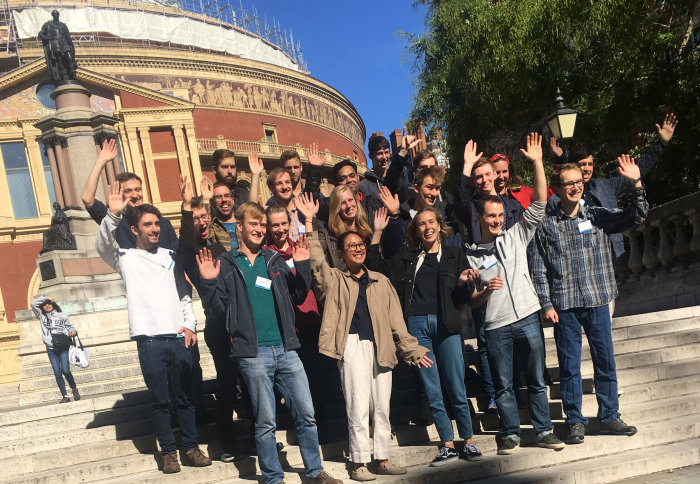Funds secured for training new environmental science PhDs
by Simon Levey

The latest intake of students on the Science and Solutions for a Changing Planet DTP
Imperial awarded a share of £100 million of government funding to extend its PhD training centre in environmental science for five additional years.
Science and Solutions for a Changing Planet Doctoral Training Partnership (SSCP DTP) has been operating for five years, with successes including 114 students publishing 76 peer-reviewed papers that were cited 443 times, and research engagement activities including 10 public-facing websites, 16 outreach events, four environmental board-games and three activities for school-age children.
However, all such training programmes established by the Natural Environment Research Council (NERC) were recently required to re-apply for their government support.

Following the announcement of funding for Imperial, the College will award 14 fully-funded studentships, starting from October 2019. Applicants with the greatest potential will be selected enter a three-and-a-half-year programme resulting in a PhD degree from Imperial College London.
This funding allows Imperial to cover includes the students' stipend, fees and research training support grant, and allows for training opportunities that develop their technical and professional skills, and extend the students' experience beyond studying for their qualification.
Professor Joanna Haigh, director of the Science and Solutions for a Changing Planet DTP, and co-director of Imperial's Grantham Institute, said:
"I am delighted that through this award, the Natural Environment Research Council has acknowledged the strength of environmental research and training at Imperial. I'm also very pleased that the Grantham Institute will be continuing to support our talented and engaging research students."
Professor Nick Jennings, Vice-Provost (Research and Enterprise) at Imperial College London, said:
“It’s testament to the hard work and excellence of all those involved that Imperial’s DTP will be extended for five more years. The Partnership has become a core part of the College’s PhD training programme and reflects our ability to deliver not only the highest quality research environment, but also innovative teaching across all our faculties and institutes."
Solutions for a changing planet

17 new PhD training centres, known as Doctoral Training Partnerships (DTPs), have been funded to bring together universities, research organisations and partners from a wide range of backgrounds, including charities, non-governmental organisations, government bodies and industry leaders.
Six partners (see box) complement Imperial's resources in both training and research, such as expertise in physical environmental systems, data science, monitoring and observation systems, environmental informatics, natural capital, collections-based research and conservation in both life and earth sciences.
The aim is to train the scientists of tomorrow by providing the scientific, professional and technical skills that increase the UK's scientific capability to solve economic problems.
Sam Gyimah, Minister for Science & Innovation, said in an official statement:
"The UK is alive with ambitious young minds that have the potential to shape the science and research landscape, stretching existing boundaries of knowledge and conquering the challenges of tomorrow.
"Making the most of the UK's world leading reputation in science and innovation is at the core of our modern industrial strategy, and it is today's young people that will fulfil this ambition to create a Britain fit for the future."
Training the leaders of tomorrow

Building on the success seen over the five years of the existing SSCP DTP programme, students will benefit from being part of a cohort, taking part in team activities throughout their PhD and have access to a variety of opportunities including internships, careers support as well as access to policy organisations and industrial partners.
From 2019, students will undertake new interdisciplinary training modules: ‘Modelling, risk and uncertainty’, ‘Innovating for sustainable development' and ‘Environmental technology and big data’, to further their skills and enable them to put their research into the context of broader global challenges.
The key scientific challenge for students will be to understand and quantify complex biological, physical and human systems in sufficient detail to predict and manage future change. They will use this knowledge will be used to develop innovative technical, business and policy responses to environmental and societal challenges.
Applications for will open online in November 2018 with full details of the available projects. For further information, email Sophie Smith, Projects Manager (Education), sophie.smith@imperial.ac.uk
Article supporters
Article text (excluding photos or graphics) © Imperial College London.
Photos and graphics subject to third party copyright used with permission or © Imperial College London.
Reporter
Simon Levey
Communications Division